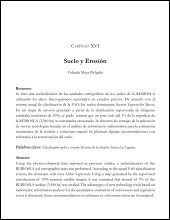Mostrar el registro sencillo del ítem
USO DE HABITAT Y COMPOSICIÓN DE LA AVIFAUNA EN TRES ZONAS DE MANGLAR DE BAJA CALIFORNIA SUR
A SURVEY OF THE COMPOSITION AND HABITAT USE OF BIRD COMMUNITIES IN THREE MANGROVE ZONES OF BAJA CALIFORNIA SUR
| dc.creator | EDGAR SANTIAGO AMADOR SILVA | |
| dc.creator | EDUARDO PALACIOS CASTRO | |
| dc.creator | RENATO ARTURO MENDOZA SALGADO | |
| dc.creator | JUAN ANTONIO DE ANDA MONTAÑEZ | |
| dc.date | 2011 | |
| dc.identifier | http://cibnor.repositorioinstitucional.mx/jspui/handle/1001/893 | |
| dc.identifier.uri | http://dspace.cibnor.mx:8080/handle/123456789/1721 | |
| dc.description | "Con base en la bibliografía e información de campo generada por los autores, se elaboró una lista de las especies de aves asociadas a los manglares de Baja California Sur, además de su estatus de conservación y de presencia temporal. Los manglares se agruparon en tres zonas; zona 1 Bahía Ballenas, zona 2 Complejo Lagunar Magdalena-Almejas, y la zona 3 Bahía de La Paz. Un total de 152 especies, 42 familias y 16 órdenes son aquí registrados para estos biotopos. El 43% (66 especies) de su avifauna es residente permanente, y el resto (57%, 86 especies) migratorio. La mayoría de las especies (115 especies) son de afinidad acuática (76%) y solamente 37 especies (24%) son de afinidad terrestre. El hábitat más importante en cuanto al número de especies fue la zona 3, con 115 especies presentes. Doce especies se encuentran en la NOM-059-SEMARNAT-2001, de las cuales una está amenazada (Branta bernicla nigricans), dos en peligro de extinción (Haliaeethus leucocephalus y Sternula antillarum browni) y nueve sujetas a protección especial." | |
| dc.description | "On the basis of bibliographical information and field data collected by the authors, a list of bird species that inhabit the mangroves of Baja California Sur was generated. In addition, the conservation status and temporal distribution of the species found were also documented. For this study, the mangroves were subdivided into three zones: (1) Bahía Ballenas, (2) Complejo Lagunar Magdalena-Almejas, and (3) Bahía de La Paz. A total of 152 species, 42 families and 16 orders of taxonomic groups were identified. The temporal composition of the avifauna was represented by 66 resident species (43%) and 86 migratory species (57%). Most avifauna, 115 species of birds, were of aquatic affinity and comprised 76% of the species found, while the remaining 37 species (24%) were of terrestrial affinity. The richest area of species biodiversity was zone 3, with 115 species. Twelve species are protected by the NOM-059-ECOL-2001, one species is endangered (Branta bernicla nigricans), two are threatened by extinction (Haliaeethus leucocephalus y Sternula antillarum browni), and nine are subject to special protection." | |
| dc.format | application/pdf | |
| dc.language | spa | |
| dc.publisher | Centro de Investigaciones Biológicas del Noroeste, S.C. | |
| dc.publisher | Centro de Investigación Científica y de Educación Superior de Ensenada. Unidad La Paz | |
| dc.rights | info:eu-repo/semantics/openAccess | |
| dc.rights | http://creativecommons.org/licenses/by-nc-nd/4.0 | |
| dc.source | Los Manglares de la Península de Baja California | |
| dc.subject | info:eu-repo/classification/AUTOR/composición, avifauna, manglar, diversidad, Baja California Sur, México | |
| dc.subject | info:eu-repo/classification/AUTOR/composition, mangrove, biodiversity, extinction, endangered | |
| dc.subject | info:eu-repo/classification/cti/2 | |
| dc.subject | info:eu-repo/classification/cti/24 | |
| dc.subject | info:eu-repo/classification/cti/2401 | |
| dc.subject | info:eu-repo/classification/cti/240120 | |
| dc.title | USO DE HABITAT Y COMPOSICIÓN DE LA AVIFAUNA EN TRES ZONAS DE MANGLAR DE BAJA CALIFORNIA SUR | |
| dc.title | A SURVEY OF THE COMPOSITION AND HABITAT USE OF BIRD COMMUNITIES IN THREE MANGROVE ZONES OF BAJA CALIFORNIA SUR | |
| dc.type | info:eu-repo/semantics/bookPart | |
| dc.type | info:eu-repo/semantics/publishedVersion |
Ficheros en el ítem
| Ficheros | Tamaño | Formato | Ver |
|---|---|---|---|
|
No hay ficheros asociados a este ítem. |
|||

